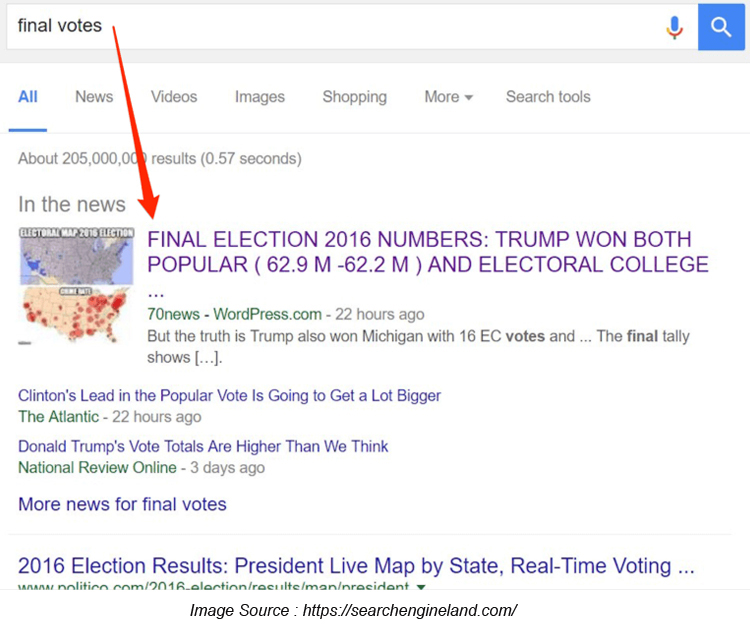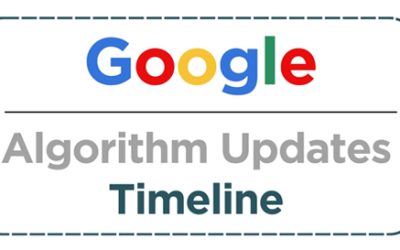SEO for doctors and medical practices keeps evolving because of the need to stay ahead of the competition in the SERPs and local search. Algorithmic changes are constantly being introduced. This year you could see Google coming up with a solution to the scourge of fake news.
When Did the Fake News Controversy Start?
The fake news issue has been something Google has been struggling with for a long time. Fake news results coming up in search rankings is a major concern and one that cannot be addressed easily, which is why Google hasn’t been to come up with a solid plan, though it has long acknowledged the issue. The search engine giant’s efforts particularly intensified in the months since November when it listed a page that came up right at the top of its section titled “In the news” that gave the final 2016 US presidential election counts. In fact, the page gave totally inaccurate results as indicated in this illustrated screenshot provided by Search Engine Land.
More Erroneous and Prejudicial Results Followed
That was followed by further erroneous results for other searches, compounded by the fact that Google’s auto complete feature, that would provide suggestions as you begin entering your search query in the search box, or as you begin saying it out on Google Home voice search, would give pretty weird suggestions such as “are women evil” when you start searching for “are women…”, as Danny Sullivan mentioned in his Search Engine Land article back in December, 2016. And the results that came up led to misogynistic content.
There are other examples of disturbing auto complete suggestions that turned up results involving baseless and erroneous content. Someone started searching through Google Home voice search, “did the holocaust….” Immediately the auto complete kicked in and the search engine presented results for “did the holocaust happen.” The results turned up sites denying the occurrence of any holocaust during the Second World War. It’s not that Google endorsed these views, but the mechanism of search algorithms brought up these results.
Facebook Came up With a Solution, but Can Google?
Facebook had to face the fake news controversy as well and announced measures to deal with it through crowd-sourcing, labels and fact checkers. But for Google, finding a solution isn’t simple. It is an unbiased search engine returning results from the web and that’s its primary mission, while ensuring the results are from qualified sources. It’s the latter part that has suffered here. It is hard to draw a line when a topic has emotional and political overtones, which is why this is more problematic than the content farm issues Google faced years ago.
But with the media pounding on the search engine giant for these inaccurate as well as ethically incorrect results from unreliable and prejudicial sources, Google took steps to resolve the issue. It has banned publishers who promote fake news ads, including “fact-checking” sites in Google News, and is testing new methods for users to report auto complete suggestions that are offensive. Google has also made tweaks to its algorithm for devaluing sites carrying non-authoritative information.
The Workings of Search Lead to Strange Results
Right from 2016, following the erroneous search results about the US presidential election, Google has been looking for ways to counter inaccurate and offensive results. As Danny Sullivan reported back in 2016, Google revealed its awareness of the problems and the intention to deal with them but also pointed out its detachment from the results that come up. Search merely reflects the content existing on the web. While Google is striving to ensure reliability and authoritativeness of the results, it does not need to endorse or agree with the views or content in the results.
Even as Google gave out that disclaimer, it has been working since then to find ways to deal with the problem. So E2M co-founder Pratik Dholakiya argues on Search Engine Land that you could see something in 2018, in terms of a major algorithmic change to tackle these offensive and non-authoritative results and fake news.
From Mere Inbound Links-based Ranking to Content Accuracy
Though Google has not revealed its plans apart from some of the measures mentioned above, Dholakiya looks to the Knowledge-Based Trust (KBT) concept proposed by Google researchers in a paper in 2015. It is a method of evaluating web page quality on the basis of the factual accuracy of the content instead of how many inbound links it has received. Now that’s a significant change in the basics of search engine optimization. However, it’s not certain as to how foolproof this system of web page evaluation could be. In any case, if Google does implement this, it could demote sites that publish fake news. Google wants truthfulness and accuracy to be made ranking factors, and so if the revolutionary KBT update is eventually implemented, will your healthcare website be prepared?
How Does the Knowledge-Based Trust Ranking System Work?
Search Engine Land’s Matt McGee further explained how the KBT ranking system would work. The original concept involved Google using an extraction process for comparing the information it finds on the web pages to the facts in its Knowledge Graph and rewarding pages that are more accurate. Instead of just examining facts in a single page of a website for determining its trustworthiness, it will also check out the other pages on the site.
The Knowledge Graph was introduced by Google back in 2012. It provides the source for the information boxes that appear along with the search results on the right side of the SERPs involving places, celebrities, events, etc. The KBT method would only work for websites that exist for fact sharing and deal with entities existing in the Knowledge Graph database.
So this system, if introduced, can potentially rank reliability and trustworthiness of sites dealing with knowledge and facts. And instead of replacing inbound links, the suggestion had been placed to use it along with Page Rank and other current signals for ranking the websites.
Digital marketing for hospitals and clinics offered by experienced medical SEO companies can help your practice be prepared for a fake news algorithmic update or the groundbreaking KBT ranking system. Efficient SEO for doctors can keep your practice in the game.





